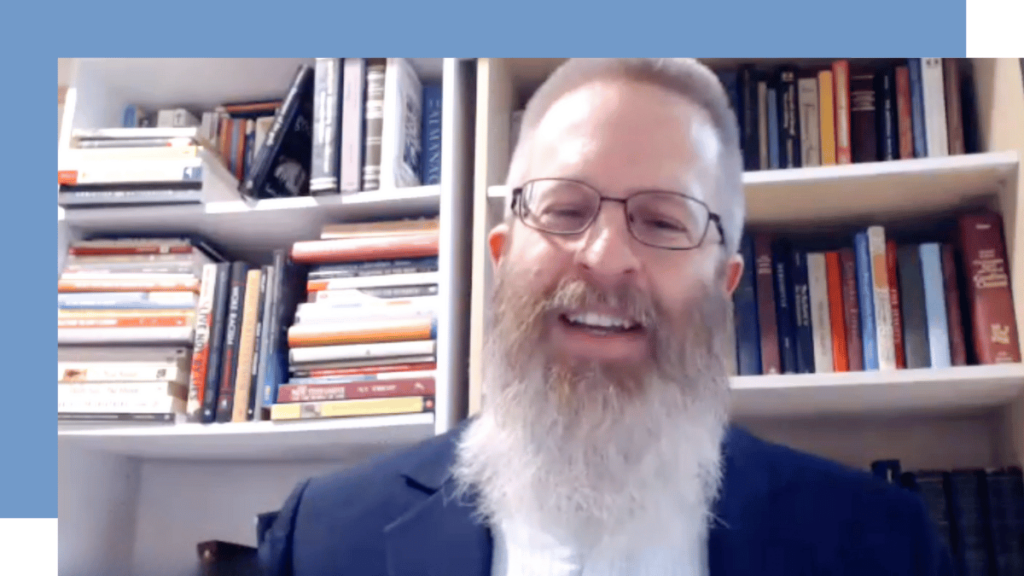This post has been adapted from a recorded interview with BibleMesh Institute Teaching Fellow Dr. Gregory Soderberg.
Tell us about yourself.
I have been a teacher my whole career. When I was in high school, I was involved in acting, and taking acting lessons from an older actor who had been in some films. God changed my direction and sidelined those plans. Instead, I ended up getting a degree in the liberal arts.
But what I learned was that teaching is a form of acting. Whether it’s 6 am in the morning or you’re tired after a long day—as a teacher you’re always faced with the task of animating the subject matter for your students. The joy of teaching is finding that enthusiasm for the subject, and transmitting that enthusiasm to the students. I’ve been a teacher my whole career, focusing on high school, but I am now teaching online in multiple roles.
You teach theology, Greek, Latin, church history, apologetics and worldview. How do you link all of those together? How does language study facilitate a deeper study of church history and historical theology?
My degrees are in church history and historical theology. My motto in teaching is that we learn from the past to live wisely in the present. In all my teaching and writing, I attempt to bring insights from the past, so that we can learn from those and hopefully not make the same mistakes.
I started teaching Greek because no one else knew Greek at the school where I worked. Through that, I fell in love with the New Testament world, and I love helping students see the context of the New Testament and the many similarities to our current times. How do different people from different races, ethnicities, or cultures work together as a church? How do we model the new life of the kingdom? When you get into the original languages, there are so many insights.
Tell us about your PhD, what you studied and why, and what you’re currently working on.
I started in a program at a different school, but I ended up at the Free University of Amsterdam. I had to change tracks, but FU was a great fit for me to teach full-time, be a parent, and complete the program just based on research.
For my dissertation, I looked at the history of how often churches have communion and as well as the history of what cultural, historical, and political factors were at play. It is a two-way-street—worship is affected by the culture, but then worship also affects culture.
One reason my PhD took about 10 years was not only was I teaching full time, and being a parent and a husband, but I also kept getting distracted in real-life church work. I was helping our church get involved in the community. I was always forced to think, how does what I am learning really apply? What does that have to say for the world now? It’s great to know what happened in the past, but how does that help us now?
The end product of my dissertation was published by Vandenhoeck & Ruprecht, which is expensive, but you can request your local library to get a copy. My hope is that pastors and others can read the arguments on both sides of the issue, whether to have communion more frequently or less frequently, and for it to be a resource for people as they decide what’s best for their church and their context.
What other things are you working on?
I recently joined the Kirby Laing Centre for Public Theology’s online economics group. It’s a unique gathering of world class economists and theologians who are discussing theological economics. While I am not an economist, I am interested in issues of justice, and how the church engages issues of social justice, as properly defined and framed.
Also, I’ve published a few pieces in Common Good magazine exploring the relationship between the Lord’s Supper and the theology of economics. The basic idea is that the Lord’s Supper shows us the way the world is supposed to be as we all gather around the Lord’s table, and it gives us a rich theology of creation and God’s superabundance of grace. What implications does that have for how we think about economics and how we practice economics?
I have another article on the Salvo blog, looking at Martin Luther and his sermons around Christmas time and what he says about issues of poverty. Basically, Luther says it is not enough just to give at Christmas time, but we need to give all year long. My goal is to bring voices from the past to help us to engage issues that we always have with us.
You teach the whole span of age ranges, cultures and languages. What do you find uniquely challenging about teaching online and how does that inform the way that you approach your role?
Teaching online is a blessing, but it has its limitations. I think the greatest drawback would be not being able to spend time with people in person. As online teachers, we have to find ways to get to know the students. A teacher has to find ways to learn who the students are persons beyond just the faces on the screen.
On the other hand, I have students from all over the world who may not have access to a quality good Christian school, and it’s great to provide that service for them.
It’s also really a blessing to be involved here at BibleMesh with students who are on their way to the mission field as well as students who have retired from their careers, but still want to learn theology. I end up learning from them, and so oftentimes they’re ministering to me. That’s the great thing about teaching—it’s always forcing you to keep learning. If you can’t explain it to a high schooler or even younger, you have no business teaching.
BibleMesh is about the Great Commandment and the Great Commission in conversation with the Great Tradition. In your own teaching, how do you see the task of forming students in those three greats?
I love the way we formulate our vision around these “three greats.” That’s a good description of what I try to do in all my teaching, really. With my high school students, we follow the model of classical Christian education and the great emphasis there is on the actual texts and the primary sources. We don’t want to just rely on someone else’s interpretation. We want to go straight to the source, whether it’s reading St. Augustine’s City of God, or Luther, or Calvin. We do that here at BibleMesh. My ambition is to not only help you learn from smart contemporary theologians, but also make sure you can read the actual historic sources and spend time with them.
BibleMesh is grateful for the work that Gregory does, the way that he serves our students, and the opportunity that they have to study under him in a variety of subjects.
Consider studying with Gregory in the BibleMesh Institute by requesting info or applying now.

